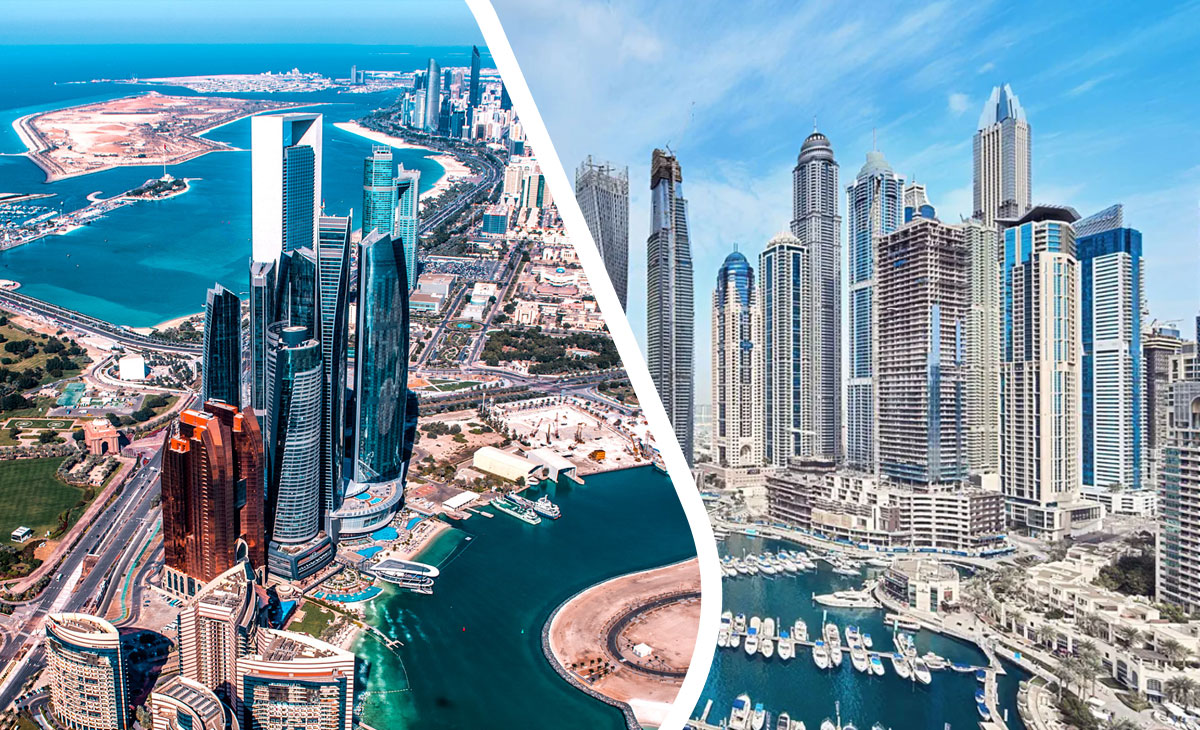The United Arab Emirates is a country known for its opulence and luxury, attracting expats from all over the world. Two of the most prominent cities in the UAE, Dubai and Abu Dhabi, are often compared when it comes to the cost of living. In this comprehensive comparison, we will delve into various aspects of the cost of living in both cities, exploring factors such as housing, transportation, food expenses, and more. By the end of this article, you will have a clear understanding of the similarities and differences between Dubai and Abu Dhabi in terms of cost of living.
Overview of Dubai and Abu Dhabi
Before we dive into the specifics, let’s take a brief look at the two cities. Dubai, often considered a global business and tourism hub, is famous for its towering skyscrapers, luxurious shopping malls, and vibrant nightlife. It has established itself as a top destination for expats seeking career opportunities and a lavish lifestyle.
On the other hand, Abu Dhabi, the capital of the United Arab Emirates, is known for its cultural heritage, stunning architecture, and a more laid-back lifestyle. It is home to numerous government institutions and is a significant hub for oil and gas industries. While it may not have the same glitz and glamour as Dubai, Abu Dhabi offers a more relaxed and family-friendly environment.
Housing Costs
One of the most significant expenses for individuals and families is housing. Both Dubai and Abu Dhabi offer a range of accommodation options, from high-end apartments to suburban villas. However, there are notable differences in rental prices between the two cities.
In Dubai, the average cost of renting a one-bedroom apartment in the city center is around AED 4,673 ($1,271), while the same apartment in the outskirts of the city would cost approximately AED 3,270 ($890). For a three-bedroom apartment in the city center, the average rent is around AED 9,120 ($2,481), while in the suburbs, it would be around AED 6,422 ($1,746).
Abu Dhabi, on the other hand, offers slightly lower rental prices. The average cost of renting a one-bedroom apartment in the city center is around AED 4,451 ($1,210), with the same apartment in the suburbs costing approximately AED 3,367 ($915). For a three-bedroom apartment in the city center, the average rent is around AED 8,266 ($2,247), while in the outskirts of the city, it would be around AED 5,983 ($1,627).
Transportation Expenses
Transportation is another significant aspect to consider when comparing the cost of living in Dubai and Abu Dhabi. Both cities have well-developed transportation systems, including taxis, buses, and metro lines.
In Dubai, the cost of a monthly public transport pass is around AED 300 ($82), while a one-way ticket for local transport would cost approximately AED 5 ($1.36). Taxi fares start at AED 12 ($3.27), with an additional AED 2 ($0.54) per kilometer.
In Abu Dhabi, a monthly public transport pass is slightly cheaper, costing around AED 270 ($73), and a one-way local transport ticket is around AED 4 ($1.09). Taxi fares in Abu Dhabi start at AED 12 ($3.27), with an additional AED 1.82 ($0.50) per kilometer.

Food Expenses
When it comes to food expenses, both Dubai and Abu Dhabi offer a wide range of dining options, from high-end restaurants to affordable local eateries. However, prices may vary depending on the type of establishment and location.
In Dubai, a typical lunch menu at a local restaurant would cost around AED 40 ($10.88), while a dinner for two at a mid-range restaurant would cost approximately AED 250 ($68). Fast food meals, such as those at McDonald’s, are priced at around AED 30 ($8.17). Additionally, a liter of milk in Dubai costs around AED 6 ($1.63), and a loaf of bread is priced at approximately AED 5 ($1.36).
In Abu Dhabi, the average cost of a lunch menu at a local restaurant is around AED 35 ($9.53), while a dinner for two at a mid-range restaurant would cost approximately AED 200 ($54.45). Fast food meals are priced similarly to Dubai, at around AED 30 ($8.17). The price of a liter of milk is slightly lower in Abu Dhabi, at around AED 5 ($1.36), and a loaf of bread is priced at approximately AED 4 ($1.09).
Healthcare Costs
Healthcare is an essential aspect to consider when assessing the cost of living in any city. Fortunately, both Dubai and Abu Dhabi offer high-quality healthcare services, with numerous hospitals and clinics catering to residents’ needs.
In Dubai, a visit to a general practitioner would cost around AED 300 ($82), while a dentist’s appointment would cost approximately AED 600 ($163). The cost of a one-month supply of common medications is around AED 100 ($27.23).
Similarly, in Abu Dhabi, a visit to a general practitioner would cost around AED 300 ($82), and a dentist’s appointment would cost approximately AED 500 ($136). The cost of a one-month supply of common medications is around AED 100 ($27.23).
Utilities and Other Expenses
When considering the overall cost of living, it is essential to factor in utilities and other miscellaneous expenses. These include electricity, water, internet, and other services.
In Dubai, the average monthly cost for utilities, including electricity, heating, water, and garbage, is around AED 650 ($177). The price of a monthly internet plan with a speed of 50 Mbps or more is approximately AED 350 ($95.35). A monthly gym membership in Dubai would cost around AED 300 ($81.68), while a cinema ticket is priced at approximately AED 40 ($10.88).
In Abu Dhabi, the average monthly cost for utilities is slightly lower, at around AED 600 ($163). The price of a monthly internet plan is similar to Dubai, at around AED 350 ($95.35). A monthly gym membership in Abu Dhabi would cost approximately AED 250 ($68), and a cinema ticket is priced at around AED 35 ($9.53).

Quality of Life and Ranking
Apart from the cost of living, many individuals consider the overall quality of life when deciding between Dubai and Abu Dhabi. Factors such as safety, education, healthcare, and recreational activities contribute to the overall livability of a city.
According to various rankings, Dubai often ranks higher than Abu Dhabi in terms of quality of life. Dubai has been ranked as the best city to live in the United Arab Emirates, while Abu Dhabi typically ranks second. In global rankings, Dubai is often placed higher than Abu Dhabi, with Dubai ranking 174th and Abu Dhabi ranking 157th among the most expensive cities in the world.
Conclusion
In conclusion, while both Dubai and Abu Dhabi offer an extravagant lifestyle, there are notable differences in the cost of living between the two cities. Abu Dhabi tends to be slightly cheaper in terms of housing and transportation expenses, while Dubai offers a wider range of dining and entertainment options. Ultimately, the choice between the two cities depends on individual preferences and priorities. Whether you prefer the glitz and glamour of Dubai or the more laid-back atmosphere of Abu Dhabi, both cities provide unique experiences for residents and expats alike.




Join The Discussion